Western Sahara: the long, lonely journey of Sahrawi activism Special Report
New in Ceasefire, Special Reports - Posted on Wednesday, December 12, 2012 5:51 - 4 Comments
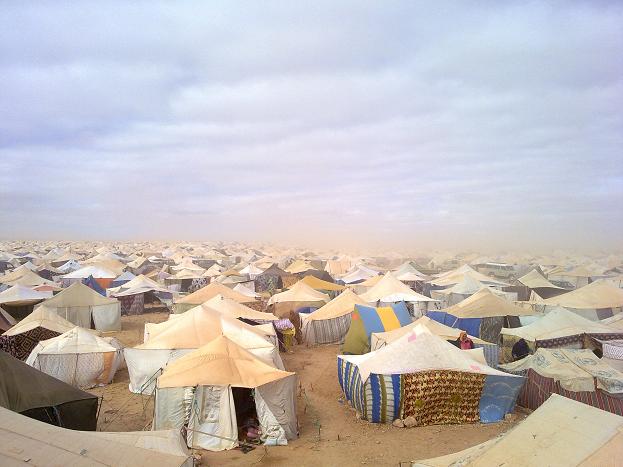
Gdeim Izik camp, Oct 2010. (Photo: Antonio Velázquez)
November marked the two year anniversary of peaceful Saharawi protests which turned into brutal clashes with Moroccan security forces. The Saharawi population – living at crossroads between Morocco, Algeria and Mauritania in what is often referred to as “Africa’s Last Colony” under Moroccan control – brought about what Professor Noam Chomsky labelled the inception of the Arab Spring. Yet, little has been said or written about it in the mainstream media, and Western governments remain silent although the violent reprisals from the Moroccan army has left four Saharawi civilians dead while twenty two remain behind bars, uncharged and waiting to face military court.
Before Rabat had ordered the crackdown, these protests were said to be the biggest non-violent act of resistance since Morocco occupied the former Spanish colony in 1975. The episode, however, is not the sole testimony to the relative dynamism of Saharawi activism over the past four decades. Next to achieving a certain degree of internationalisation, Saharawis at the forefront of the national cause assembled tens of thousands of their would-be fellow citizens in large camps which have since become the headquarters of their self-determination plea.
There was never good momentum though. Global media blackout and the sneering neglect of many leading actors and institutions on the international arena undoubtedly did not help. However, Saharawi activists have not forged alliances with sympathetic Moroccan counterparts, who may not always back independentist aspirations but whose own struggle against Mohammed VI’s monarchist authoritarianism surely paves the road to a more democratic state where rights of any kind would be preserved and peaceful coexistence could be met.
Inception: The beginning of Saharawi resistance
Local activism in Western Sahara is not a recent trend. The indigenous Saharawi population has resisted foreign domination ever since Spain occupied their land, forcing the European colonisers to schedule a referendum for 1975. By then, according to a special Visiting Mission from the UN, the nationalist Polisario Front had already rallied a mass movement.
Subsequently, Rabat went to the International Court of Justice, only to be told that the North African Monarchy had no sovereignty over the territory. Undeterred, the late King Hassan II sent 350,000 settlers to occupy the Spanish Sahara in the so-called ‘Green March’, condemned by the UN Security Council. The referendum was postponed and ultimately scrapped.
As Moroccans occupied Western Sahara, most of the Saharawi population fled indiscriminate shelling and napalm bombing to seek refuge in Tindouf, in the south west of neighbouring Algeria. There, Polisario founded the Saharawi Arab Democratic Republic (SADR) where roughly 200,000 indigenous refugees remain scattered ever since.
Unsurprisingly, the Makhzen – a popular word to describe the Royal Court’s control over the Moroccan state – did not yield. A wall was erected to fence off the Polisario in Tindouf, and the camps thus became the non-official capital of the Saharawi-state-in-exile. Backed up by economic and military support from France and the US, Rabat set to build a 2,700 km berm with explosive mines and soldiers stretching from the Atlantic Ocean to the Saharawi camps, said to be the world’s longest military barrier.
Until the peace process was launched in 1991, arbitrary arrests, garde à vue arrest (incommunicado) methods and tortures were common practices in the Western Sahara’s occupied territories. During Morocco’s ‘Years of Lead’, Hassan II’s regime targeted both Moroccan and Saharawi civilians. However, Amnesty International reports that the latter were disproportionally affected, especially in cases of enforced disappearances, reaching between 249 and 1,500.
Dahha Rahmouni, then a young protester and currently a leading activist, remembers how he was blindfolded and arrested by Moroccan plain-clothed agents following a UN technical mission in 1987. “During four years we suffered tortures and had no contact with the outside world. They arrested me another 4 times without charges. We got used to this state of fear”, the human rights activist told Ceasefire.
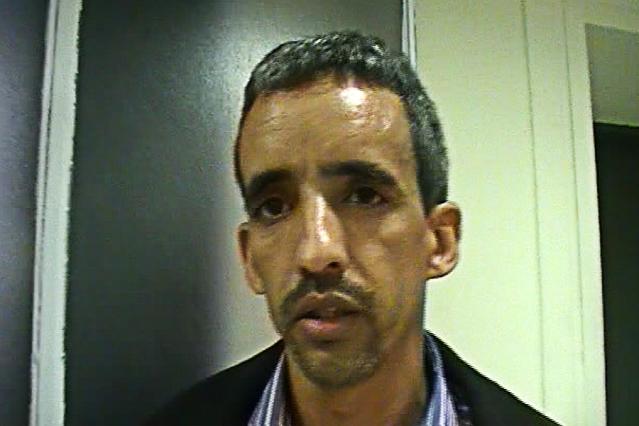
Dahha Rahmouni. (Photo: Ángel Martínez)
Although both Moroccan and Saharawi societies suffered state-orchestrated repression, the early stage of activism in the region made infeasible any connection between the two. More importantly, Hassan II never shied away from using the Western Sahara issue as a political tool to boost his own credentials as staunch defender of national unity through populist discourse. Meanwhile, the fate of Saharawis became Rabat’s favourite scapegoat to thwart military coups and inject more public funds into its military presence and Moroccan-sponsored development in the occupied regions.
Internationally, Moroccan propaganda, combined with an information blockade across the occupied territories, aborted any attempt of building a transnational network of activists. Yet, some human rights advocacy groups began to raise awareness in Europe. Mohamed Ahmed Laabeid, ex-member of the first Saharawi human rights organisation, created in 1989, explained to Ceasefire the restrictive Moroccan law: “although AFAPREDESA [the first organisation of the kind] has been prohibited by Rabat, it continues working inside the occupied territories and even inside Morocco itself”.
Eclosion: the failure of diplomacy and the shift of battlefield in the Saharawi struggle
The UN Settlement Plan brought about the illusion of an eventual referendum, but the Makhzen is never short of tricks to hamper any prospects of a peace agreement. Rabat’s cunning manoeuvres went as far as sending a second ‘Green March’ of thousands of settlers to Western Sahara in the early 1990s. Seduced by generous housing subsidies and other state benefits, outsiders eventually outnumbered the remaining Saharawi indigenous population by a ratio of more than 2:1.
In the meantime, the UN special mission in the territory (MINURSO) stood toothless in the face a dismissive Rabat, and as more light was shed on its dubious managerial practices, condemnatory voices found no echo, including the outspoken criticisms of former US ambassador Fran Ruddy.
MINURSO’s inefficiency has had dramatic effects on the Saharawi population living under Moroccan rule. MINURSO is the only UN mission with no mandate to supervise human rights violations, a deplorable state of affairs which reduces this UN agency to a mere witness to the impunity with which Moroccan authorities oppress the Saharawi minority. Unequipped with enforcement mechanisms, MINURSO would not be able to lift a finger should any party snub the results of the stalled referendum – if it ever takes place.
The vagueness of the UN intervention in the conflict is staggering. Anna Theofilopoulou, former UN staff who closely worked with the personal envoy on Western Sahara, spoke of the pervasive off-the-record belief among her colleagues: “no referendum was going to happen”. The admission is barely shocking. When MINURSO begun its mandate in 1991, “no mechanisms were included because there was the illusion that the referendum was going to happen within a year”, Theofilopoulou revealed to Ceasefire. More than 20 years on, these flawed initial assumptions were never subjected to scrutiny or reconsideration.
This incoherence at the UN policy level did not boost contact between Moroccans and Saharawis, it has rather fuelled resentment between the two parties on the ground while nurturing chimeras of a peaceful solution within the international community milieus.
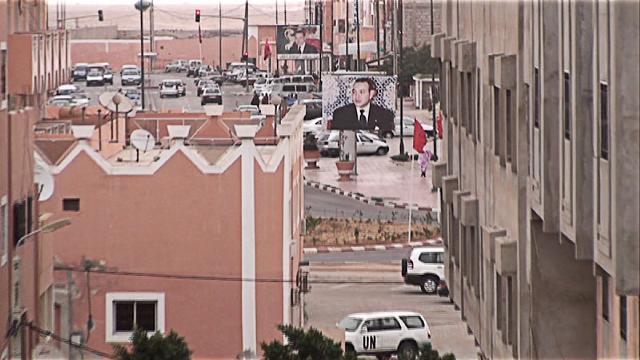
Moroccan banners and UN patrol in El-Ayoun. (Photo: Antonio Velázquez)
The unfinished decolonisation process, alongside the UN’s inoperability and the failure of formal diplomacy, increased Saharawis’ frustration. In 1999, after nearly ten years of futile negotiations, a popular uprising shook El-Ayoun, capital of the occupied territories, as Saharawi people protested against the impoverishment of the region. After the death of the then-King Hassan II, the Moroccan regime violently dismantled the camp and encouraged local thugs to attack the Saharawi population. Demonstrations and detentions spread to different cities both in Western Sahara and Morocco. Although Moroccan human rights organisations and intellectuals, such as the AMDH, timidly denounced the repression, their position did not transcend words and no dialogue was established between the two communities after such condemnations.
Labelled by locals as the first Saharawi intifada,- the Arab term for “popular uprising”, mostly used in the context of Palestinian resistance -, this upsurge “was a radical change as the Saharawi population is no longer afraid of Moroccan abuses and the proof of this is that demonstrations for self-determination have increased since then”, stated Laabeid describing the episode to Ceasefire.
This event did not only break the wall of fear, but also shifted the battlefield from the unsuccessful diplomatic strategy of the Saharawi government to the activism of the population living under Moroccan control. As a result, fragile, yet burgeoning, links were also established between Saharawi and Moroccan civilians protesting against the regime’s economic policies.
Moreover, the accession to the throne of King Mohamed VI prompted a space for modest reforms praised by the international community. Morocco was the first Arab state promoting the creation of national human rights institutions together with the institutionalisation of international human rights norms. It goes all smoke and mirrors however when truth commissions are entrusted with investigating violations against the Saharawi people. Al-Makhzen has drawn firm red lines on any issues seen as a threat to “territorial integrity”. Unsurprisingly, it was accused of co-opting nascent NGOs whose missions involve looking into human rights abuses. Distrust towards potentially sympathetic Moroccan activists has therefore soared.
Internationalisation: State interests and the dilemma of Saharawi activism
Stifled by Rabat-led propaganda and cut off from the rest of the world, Saharawi activism has not claimed its place in international news until about a decade ago when social media facilitated the sharing of information. A popular upsurge in 2005 was widely reported following a violent crackdown on peaceful sit-ins and the assassination of a young Saharawi demonstrator. Mustafa Ahmed, who participated in the protests, told Ceasefire that riots, clashes and detentions lasted for an entire year.
The international community, rather shamefully, once again turned a blind eye on the events. And when human rights watchers tried to investigate it, a fact-finding mission by the European Parliament was repeatedly blocked by Rabat. Global awareness was hence kept at bay until Aminatou Haidar’s hunger strike in 2009. Rabat only bowed under the pressure of its western allies, led by Paris and Washington, and eventually the prominent activist was given carte blanche to return to El-Ayoun. Consequently, Saharawi non-violent resistance featured significantly, for the first time, in international coverage.
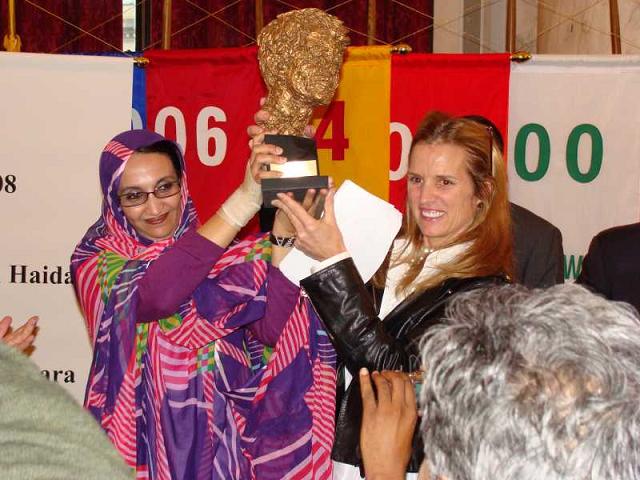
Aminatou Haidar and Kerry Kennedy. (Photo: Norwegian Support Committee for Western Sahara)
Meanwhile, transnational links between Saharawi and European activists began to burgeon, focusing mostly on illegal exploitation of under-soil natural resources. Saharawi fisheries account for a major part of Morocco’s fishing industry, and its phosphate reserves are one of the largest in the world. Furthermore, the struggle over offshore oil and agricultural products in Western Sahara involve private and state interests alike. So far, international activist networks have gained European political support in condemning the labelling of Saharawi agricultural products as Moroccan. Likewise, campaigners successfully lobbied the EU to reject the four years Morocco’s Fish Agreement in 2011 due to Brussels casting doubts over its legality.
Yet, this activism has had little effect on Moroccan repression. MINURSO still does not contemplate any mechanisms to prevent the continuous Moroccan human rights violations, although France was pressured to include the vague terminology of human rights “measures” in a UN Security Council resolution in 2011. Of course, Paris has had Rabat’s back since the beginning of the conflict, and the former colonial master remains the main trading partner, lavishing the Moroccan regime with 2.8 billion dollars in civil and military support in 2007 alone.
In the most vivid of neo-colonial fashions, Al-Makhzen is thought a strategic regional ally by the EU and the US. The latter has reportedly shown governmental support to Rabat’s ambivalent autonomy proposal for the occupied territory. Morocco’s geographic coordinates attract European and American development and military aid, dedicated to anti-terrorism, anti-trafficking and immigration mitigation programmes. With too many strings attached, it is highly unlikely that the members of the Security Council would force Rabat to give up its ambitions over Western Sahara. Anna Theofilopoulou puts it succinctly: “The UN will not solve this problem”.
The general consensus over maintaining this stalemate on the Saharawi cause is not hard to apprehend. Some are nevertheless less grim about the prospects of rapprochement between Moroccan and Saharawi activists. Street protests inside the Western Sahara occupied territories caused a handful of Moroccans to voice their discontent towards their own economic impoverishment.
However, these few outspoken and like-minded Moroccans fear political retaliation and other forms of judicial harassment. “They will bury me alive if I joined you so we better organise protests inside El-Ayoun”, a Moroccan told Sidi Ahmed, a Saharawi activist who participated in the Gdeim Izik protests in 2010. Dahha Rahmouni, member of the Saharawi human rights organisation ASDVH, also concedes that contact with Moroccan counterparts is “complex and most of the times non official”.
Interactions between ordinary citizens on either side of the conflict remain a taboo even amongst the diaspora abroad, says Zahra Ramdan, president of the Spanish Association of Saharawi Women. Furthermore, these connections, when established, are misinterpreted. Such is the case of Ali Lmrabet, a Moroccan journalist, who told Ceasefire that “there are connections between the main Moroccan human rights organisation and Saharawis, but they are strictly related to human rights, away from political vindications”. As if advocating for rights was not a political demand, or that self-determination was not a human right too.
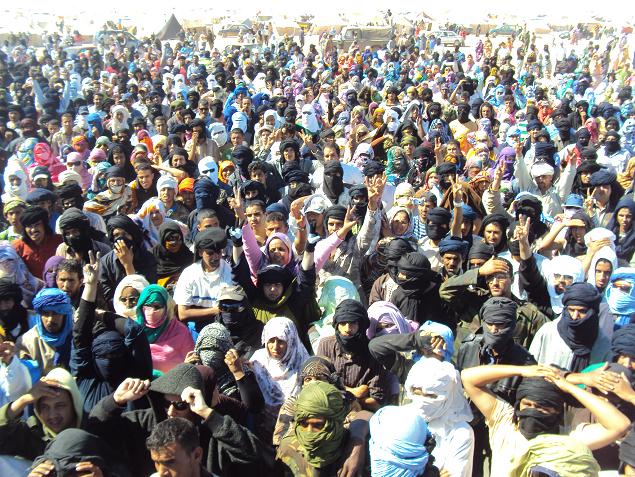
Saharawi demonstration 2010. Photo Antonio Velazquez
The quandary is directly related to Saharawi activists pursuing fundamentally different goals to their Moroccan counterparts. One side advocates for the right to self-determination under a free and fair referendum while the other merely seeks universal improvement in socio-economic and political rights, for Moroccan and Saharawis alike.
Jamal Bachri, a Saharawi freelance journalist and campaigner, explained to Ceasefire how “Saharawis have nothing to do with democracy in Morocco… That is something purely Moroccan and is none of our concern. Yet, we believe if there is any democracy in Morocco, then their approach vis a vis the question of Western Sahara can change a bit.”
Saharawi activists agree that their Moroccan counterparts seek an ‘internal’ change, which substantially differs from the right to self-determination that should be ‘internationally’ pursued via referendum as part of an unfinished decolonisation process.
Despite the overt differentiation, the conflict could be largely portrayed as a juxtaposition paradigm between realpolitik and international law, where Security partnerships, geopolitics and economic agreements with Morocco have prevailed over international law. As UN agencies become standby spectators, the only route for an eventual referendum may require substantial democratic reforms within the kingdom as well as well-thought programmes to overcome the deep grudges and reconcile the two societies.
Regrettably, all indicators point in the other direction. To jump-start cooperation, Moroccan and Saharawi activists may need to acknowledge that there couldn’t be a democratic Morocco without a solution to the Western Sahara conflict in as much as there couldn’t be a free and fair referendum without a democratic Morocco.
Saharawi activists could deploy their efforts towards a real democratisation of Morocco in the hope of increased spaces to promote and campaign for their cause. This approach, however, is not without major risks of losing sight of their ultimate aim: self-determination.
4 Comments
Uutiskirje Länsi-Saharasta, viikko 50 -- Kansa vailla kotia
Western Sahara: the long, lonely journey of Sahrawi activism - Ikkevold | Ikkevold
[…] however, is not without major risks of losing sight of their ultimate aim: self-determination. Western Sahara: the long, lonely journey of Sahrawi activism | Ceasefire Magazine.Legg igjen en kommentar Avbryt svarDin e-postadresse vil ikke bli publisert. Obligatoriske felt er […]
bah maoulo7ud
we will struge for ever
WESTERN SAHARA: Western Sahara: the long, lonely journey of Sahrawi activism | Tahrir-ICN
[…] Author bio details: Angel L. Martinez is a London-based freelance journalist, researcher and activist. He holds a MA in International Politics from City University and has published for Spanish and Maltese media. His blog can be found at [email protected]. He tweets at @AngelLMartnez.Source: cease fire […]



[…] Special Report | Western Sahara: the long, lonely journey of Sahrawi activism (englanniksi) […]